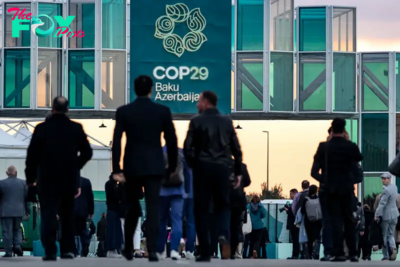World News
The Global Gender Divide We Really Should Be Talking About
There are three facts about South Korea that it would be wise to pay attention to.
First, the nation’s fertility rate has plummeted to below one child per woman, which means a nation of around 50 million people today will shrink by half in just a generation. Second, the current President, Yoon Suk Yeol, won election in 2022 on an explicitly anti-feminist agenda, with a promise to abolish the ministry for gender equality. Third, there is a massive political divide in the country between young men and young women.
These trends are inextricably related. Young men and young women do not see their interests as being aligned, but in conflict. As politics gets more divided between the sexes, maternity wards get quieter. And where South Korea leads, many fear that other advanced economies may follow. Similar political gaps are opening up in the U.S., for example.
The normal pattern is of left-right divides between generations, with younger voters typically more liberal than older ones. But in recent years a remarkable political chasm around the world has opened up between men and women within a generation, specifically Gen Z. Data from Gallup shows that in the U.S., women aged 18 to 30 are now 30 percentage points more liberal than their male counterparts. This gender gap in ideology is five times wider than in 2000, and wider than at any previous point in polling History. There are similar gaps in Germany and the U.K. and much starker divides in South Korea and China.
This new trend has political scientists scratching their heads.
“This points to a real risk of fractious division among this coming generation of young—and the need to listen carefully to both,” says Professor Bobby Duffy of King’s College London, a leading expert on politics and generational change.
A shared trend is a turning away from feminism among young men, even as women turn more strongly toward it. A 2023 survey by Equimundo found that just 47% of men in the U.S. aged 18 to 23 agreed with the statement that “feminism has made America a better place,” compared with 56% of men aged 38 to 45. This is a shocking development.
Daniel Cox, a scholar at the center-right American Enterprise Institute think-tank, is documenting these trends closely in the U.S., arguing that “at no time in the past quarter century has there been such a rapid divergence between the views of young men and women.”
Perhaps what’s most troubling here is the rise of zero-sum thinking with regard to gender. Some 38% of Republican men, for example, agree with the statement that “the gains women have made in society have come at the expense of men.” Zero-sum calculations of this kind, not only with regard to gender but also race or immigration, can lead to the political equivalent of trench warfare, with each side digging in that leaves everyone worse off.
In a zero-sum political environment, merely drawing attention to the problems of boys and men can be seen as somehow downplaying the ongoing challenges facing girls and women. This is why Democrats, in particular, are so reluctant to directly address male issues. That is a recipe for bad politics.
But the cultural consequences of this neglect are even more important. Many American men feel like their concerns—in mental Health, Education, work, and family life—are not taken seriously enough. And they are not entirely wrong about that. The suicide rate is four times higher for men than women, and has risen by a third among young men since 2010. Women and girls are leaving boys and men in the dust in the classroom and on college campuses. Over the last few decades, wages for working class men have stagnated.
These are real problems. And problems become grievances if they are neglected. As Daniel Schwammenthal, director of the American Jewish Committee’s Transatlantic Institute, says, “The iron rule of Politics is that if there are real problems in society and responsible parties don’t deal with them, the irresponsible parties will jump on them.”
As the work of AEI’s Cox shows, one of the big differences between young men and women is not just along partisan lines, but with regard to the importance of politics altogether. While young women feel strongly about a wide range of issues, from the environment to reproductive rights, young men are simply not as engaged. In Cox’s polling, there is no single major issue where young men are more engaged than young women.
More than turning to the right, young men are turning away from Politics altogether. This is not surprising when the progressive left offers an echoing silence on men’s issues, and the reactionary right offers fiery rhetoric but no real solutions. Disenchanted, many simply shrug their shoulders.
The chasm opening up between young men and women does not augur well on a number of fronts. First, it is likely to entrench polarization, if these political divisions turn out to be lasting. Second, the political divide could lead to lower rates of family formation—after all, who wants to sleep with the enemy?—and potentially even lower fertility rates. Third, a permanent ideological canyon between men and women is likely to worsen wellbeing. In part, this is because family life is typically an anchor for our identity and purpose. We are already at risk of a “friendship recession.” Fraying ties between men and women could make it deeper.
Back in 1975, the cultural anthropologist Margaret Mead observed the early signs of some gender divergence. “Roles are changing for both men and women,” she wrote. “Women are being pressured ... to believe that their past status was brought about by male oppression. At the same time men ... are being accused of being oppressors—and angry oppressors at that. The whole process of change is taking place in an atmosphere of the greatest bad temper.”
After a period of relative calm in the sex wars, we are in danger of entering another period of bad temper. But this time, the stakes are even higher.
-

 World News2d ago
World News2d agoLandmark Bill to Ban Children From Social Media Introduced in Australia’s Parliament
-

 World News2d ago
World News2d agoAmerican and Australian Tourists Die in Laos After Drinking Tainted Alcohol
-

 World News2d ago
World News2d agoSee Photos of the Seventh Volcanic Eruption on Iceland’s Reykjanes Peninsula in 12 Months
-

 World News2d ago
World News2d agoMuhammad Yunus on the Race to Build Bangladesh 2.0
-

 World News3d ago
World News3d agoU.S. Charges Indian Billionaire Gautam Adani With Defrauding Investors
-

 World News3d ago
World News3d agoU.S. Vetoes U.N. Resolution Demanding a Cease-Fire in Gaza
-

 World News3d ago
World News3d agoPutin Signs New Doctrine Lowering Nuclear Weapons Threshold in Warning to U.S.
-

 World News3d ago
World News3d agoTens of Thousands Rally at New Zealand’s Parliament in Support of Māori Rights



























